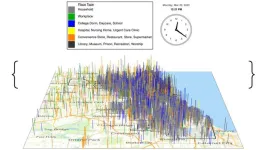(Press-News.org) Up to two-thirds of patients with Tourette syndrome (TS), a tic disorder characterized by sudden uncontrollable physical movements, also suffer from obsessive-compulsive disorder (OCD), a psychiatric condition characterized by intrusive thoughts and repetitive behaviors. Unfortunately, many of these dual-diagnosis patients are resistant to conventional treatments such as medications or behavioral therapy. While deep brain stimulation (DBS) has been approved for compassionate use by the U.S. Food and Drug Administration for OCD, this promising procedure is under investigational use for TS.
Dr. Sameer Sheth, Dr. Wayne Goodman, Dr. Steven Bellows, and their colleagues at the Jan and Dan Duncan Neurological Research Institute (Duncan NRI) at Texas Children’s Hospital and Baylor College of Medicine, have recently demonstrated favorable outcomes using a new DBS approach that targets two distinct brain regions to simultaneously treat OCD and TS. The study, published in Biological Psychiatry, not only demonstrated the feasibility and effectiveness of using dual-target DBS to simultaneously treat these disorders but also advances understanding of the functional bases of these complex neuropsychological conditions.
“It is challenging to treat severely affected dual-diagnosis patients, many of whom do not respond to current treatments. Unfortunately, several previous attempts at using standard DBS approaches focused on a single brain target have failed to show marked sustained improvement in this cohort of patients,” said Dr. Sheth, who is also the director of Cain Foundation Labs for Pediatric Neurology at Duncan NRI and professor in the department of neurosurgery at Baylor College. “For this reason, we decided to simultaneously target two distinct regions of the brain – one implicated in OCD and the other in TS.”
A multidisciplinary team of experts selected two patients as ideal candidates for testing this dual-target DBS surgery. Both patients presented with severe forms of both conditions and, despite extensive treatment histories, had not shown sustained clinical improvements. Dr. Sheth implanted a pair of DBS electrodes in the bilateral ventral capsule/ventral striatum (VC/VS) region to treat OCD and another pair in the posteroventral (motor) globus pallidus internus brain area to treat TS using an established robotic procedure for DBS.
The new dual-target DBS strategy allowed Dr. Goodman and Dr. Bellows the flexibility to program the two DBS devices independently in order to achieve optimal and sustained improvement in severe OCD and TS symptoms in both patients.
Additionally, the DBS system they used not only stimulated these brain regions but also utilized recently available technology to record neural activity at different symptom states on the DBS device. These brain recordings allowed them to get a snapshot of the neural activity in that region at specific times (i.e. when OCD or TS symptoms were better or worse). The advantage of such a system is that it can be used to study the disease-modifying effects of DBS therapy on OCD- and TS-associated neurophysiology and thereby, optimize the delivery of this therapy in the future.
“The eventual goal is to move towards a ‘closed-loop’ DBS which will function analogous to how the thermostat in our homes regulates temperature,” Dr. Sheth added. “When we set a particular temperature, the system automatically regulates the heating and cooling to ensure that the desired temperature is achieved and maintained. Similarly, as we understand the desired pattern of brain activity associated with healthy, asymptomatic states, we can train the DBS device to automatically adjust stimulation parameters in order to achieve and maintain that desired state. In order to move towards this goal, we need a better understanding of the intricate relationships between changes in neural signals and disease symptoms, which is what studies like this are helping build.”
Others involved in the study were Ricardo Andres Najera, Nicole Provenza, Huy Dang, Kalman Katlowitz, Alyssa Hertz, Sandesh Reddy, Ben Shofty, and Eric Storch. They are affiliated with one or more of the following institutions: Baylor College of Medicine and Texas Children’s Hospital. The study was funded by grants from the National Institutes of Health and supported by the McNair Foundation.
END
Texas Children’s and Baylor College researchers use innovative dual-target deep brain stimulation approach to treat patients with obsessive-compulsive disorder and Tourette Syndrome
2023-04-06
ELSE PRESS RELEASES FROM THIS DATE:
USC study: Disruptions in exports of grains from Ukraine and Russia cost the world’s economy more than $1.6 billion during the first year of war
2023-04-06
Russia’s invasion of Ukraine has struck a major blow to global markets for vital commodities – particularly grains like wheat and maize. Shortages and price increases are contributing to the food insecurity crisis in certain parts of the world, according to the United Nations, and to more general economic uncertainty.
A new study led by Adam Rose, research professor at the USC Sol Price School of Public Policy and its Center for Risk and Economic Analysis of Threats and Emergencies (CREATE), estimates that disruption to exports of grain commodities during a projected one-year period of the war will result in a $1.6 billion loss for the global economy.
The study was recently ...
Lifesaving drug for severe bleeding after childbirth could be made accessible for all, study suggests
2023-04-06
Intramuscular administration of tranexamic acid (TXA), a drug used to target severe bleeding after childbirth, is safe and quickly reaches therapeutic concentrations in pregnant women, according to a study involving researchers from the London School of Hygiene & Tropical Medicine (LSHTM).
The findings, from the Woman-PharmacoTXA Phase 2 trial, highlight that intramuscular injection may be a potential alternative to current intravenous approaches, which are often unsuitable in home births or rural care settings.
Oral TXA was also well-tolerated, however, on average, took around one hour to reach therapeutic ...
New technology to select healthier sperm for IVF success
2023-04-06
Scientists have developed new technology to help couples undergoing in-vitro fertilisation (IVF) due to male fertility problems to increase their chances of success in having a baby.
Approximately one in six people worldwide is affected by infertility, according to the World Health Organization, and one in every 22 children in Australia is born via assisted reproduction. With a 78% failure rate, each IVF cycle can be an emotional rollercoaster that often ends in heartbreak.
“Male infertility plays a role in around 30% of cases, due to problems such as low sperm count, reduced motility ...
Discovery of ferroelectricity in an elementary substance
2023-04-06
National University of Singapore (NUS) physicists have discovered a novel form of ferroelectricity in a single-element bismuth monolayer that can produce regular and reversible dipole moments for future applications of non-volatile memories and electronic sensors.
Ferroelectricity refers to the phenomenon of certain materials exhibiting a spontaneous electric polarisation that can be reversed by applying an external electric field. Ferroelectric materials are characterised by a crystal structure that lacks a centre of ...
Immunology Center of Georgia recruits reflect expertise from immune cells that can smell to better understanding inflammatory bowel disease
2023-04-06
AUGUSTA, Ga. (April 6, 2023) – Immune cells that can “smell” the metabolites of a high-fat Western diet and may produce inflammation and ultimately heart disease as a result, just what our “longer” RNAs are doing in our bodies and the role of immune cells called neutrophils in both cancer and heart disease are some areas of pursuit of the first five scientists recruited to the new Immunology Center of Georgia at the Medical College of Georgia.
The new IMMCG, codirected by Georgia Research Alliance Eminent Scholars Catherine “Lynn” Hedrick, PhD, and Klaus Ley, MD, who joined the MCG ...
Changes in infant emotion regulation following maternal treatment for postpartum depression - A free webinar from the Brain & Behavior Research Foundation
2023-04-05
The Brain & Behavior Research Foundation (BBRF) is hosting a free webinar, “Changes in Infant Emotion Regulation Following Maternal Treatment for Postpartum Depression” on Tuesday, April 11, 2023, at 2:00 pm EST. The presenter will be Ryan J. Van Lieshout, M.D., Ph.D., FRCPC.
Postpartum depression affects up to 1 in 5 mothers and is associated with elevated rates of emotional, behavioral, and cognitive problems in offspring. It may have particularly negative effects on infant emotion regulation - the ability to modify emotions ...
Digital device access could promote health for youth in sub-Saharan Africa
2023-04-05
Access to mobile technology is extremely common in the United States, so much so that it is hard to imagine daily life without it. More than 86% of Americans report using their smartphone as their primary source of obtaining information. Low- and middle-income countries that do not have easy access to digital media face deficits in receiving information, including knowledge related to health.
A recent study by Dongqing Wang, assistant professor in the Department of Global and Community Health, evaluated the access to digital media and devices, such as mobile phones, computers, tablets, social media, and the internet, among adolescents in sub-Saharan ...
Projects to fight biological threats receive $5 million in federal funding
2023-04-05
Modeling the emergence and spread of biological threats isn’t as routine as forecasting the weather, but scientists in two of the U.S. Department of Energy’s (DOE) national laboratories were awarded funding to try to make it so.
DOE’s Argonne National Laboratory and Sandia National Laboratories were one of the three projects to receive a total of $5 million from DOE to advance computational tools to better prepare for natural and human-created biological threats. The laboratories will work together to harness Sandia’s algorithms of real-world outcomes to Argonne’s high performance models that address spread ...
MSU study confirms: 1 in 5 adults don’t want children –– and they don’t regret it later
2023-04-05
EAST LANSING, Mich. – Last summer, researchers at Michigan State University reported that one in five Michigan adults, or about 1.7 million people, don’t want children and therefore are child-free. Although that number was surprisingly large to many data has now been confirmed in a follow-up study.
“We found that 20.9% of adults in Michigan do not want children, which closely matches our earlier estimate of 21.6%, and means that over 1.6 million people in Michigan are child-free,” said Jennifer Watling Neal, MSU professor of psychology ...
Sleep problems? You may have an increased risk of stroke
2023-04-05
EMBARGOED FOR RELEASE UNTIL 4 P.M. ET, WEDNESDAY, APRIL 5, 2023
MINNEAPOLIS – People who have sleep problems may be more likely to have a stroke, according to a study published in the April 5, 2023, online issue of Neurology®, the medical journal of the American Academy of Neurology. Sleep problems included getting too much or too little sleep, taking long naps, having poor quality sleep, snoring, snorting and sleep apnea. In addition, those who had five or more of these symptoms had an even greater risk of stroke. The study does not show that sleeping problems cause stroke. It only shows an association.
“Not only do our results suggest that individual sleep problems ...



